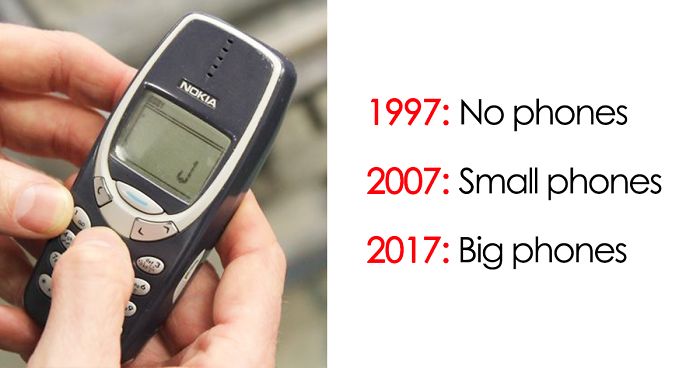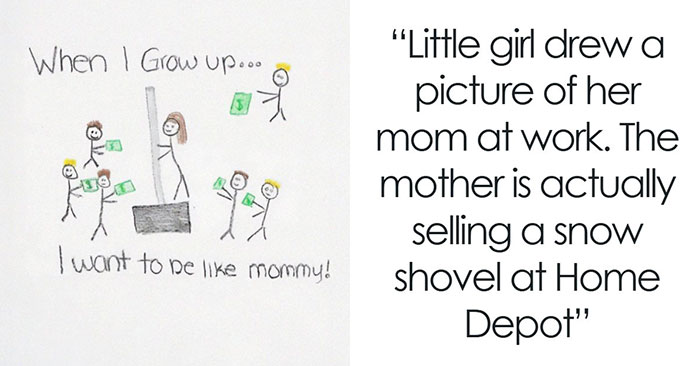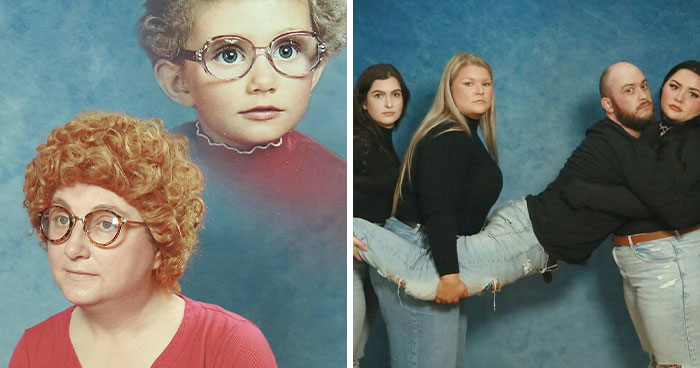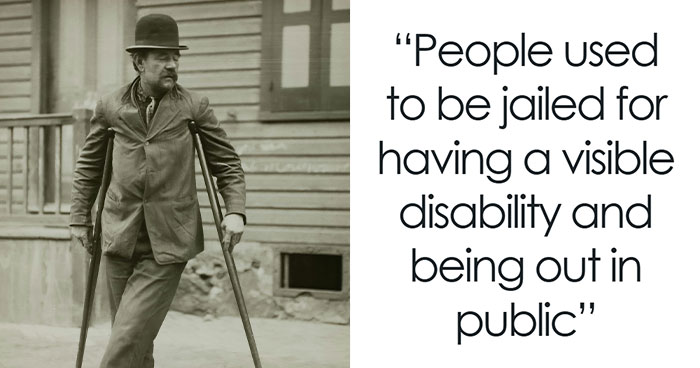
85submissions
Finished
85 Teachers Explain The Differences Between 1997, 2007, & 2017 Students, And Some Of Them Are Worrying
It's obvious that today's students' taste in music, clothes, and technology has massively changed since 2007, and even more since 1997, but what about the way they learn? The teachers of Reddit were asked this very question, and the differences they revealed between students from each decade are both humorous and troubling.
Some educators observed positive changes, like an increase in overall politeness among young people, and the acceptance of diversity in the classroom. Others, however, noted lower self-confidence, higher anxiety, and an unhealthy dependence on technology and the Internet as only the beginning of the problems learners face in 2017.
Scroll down to find out what teachers from 1997, 2007, and 2017 said about how students have changed over each era, and if you're a teacher yourself, add your testimony at the end!
This post may include affiliate links.
My dad taught middle school from 1968-2004, when he retired i asked him what changes he saw in students from the beginning of his teaching career to the end. he answered; "the kids never changed. a teenager is always a teenager. the parents however, changed dramatically. they used to respect teachers and side with us in disciplinary matters, but now they think their kids are perfect and we are wrong. glad i'm getting out before it gets worse."
'97 - "Quit passing notes" '07 - "Quit texting" '17 - "Are you seriously watching Netflix right now?"
Accurate from the start till the end. My technology-obsessed classmates do this. The only concern teachers have about the creative part of the class(me and fortunately, 55% of the others) is that they might read books or draw comics during the most boring classes
Im not even a teacher, just a high school senior, but i'd like to make a comment. Us kids often hear stories about how our parents were raised. Anecdotes such as, "when we were kids, we used to leave the house after school without telling our parents where we were going or when we would be back. We would bike with out friends to a creek and hang out until 1 A.M." - (my dad) I bring up this example because it is so drastically different nowadays. Kids back in the 70s - 90s had much more independence than they do now. If i want to go out, i have to tell my parents where I am going, who with, and when I'll be back. Part of the reason for this is the perceived danger of modern times. Many adults believe their generation was much safer than ours is, despite research indicating exactly the opposite. (Probably because of the media's coverage of everything bad that goes on.) Anyway, my point is that kids today never had the independence they needed to succeed in life. They/we are constantly relying on another person to help us out. And if you think about it, nature vs nurture... nature hasn't changed much, but the way we are raised has drastically shifted.
That's really true. It would also explain the higher anxiety, since it would mean that people don't get the chance to be comfortable in public situations and real life.
In 97 you could have failed your sophomore year, done well junior, slacked off senior and gotten into an Ivy League school, in '07 you could only slack off senior year and make Ivy. In 17 if you get a C in AB calculus while doing every other class AP you can kiss an ivy leauge school away. Also I've noticed a lot more kids need medication for stress, anxiety, and depression because of said stress.
Not a teacher, but many in the family (elementary level). And they say the kids are basically the same, but the parents are sooooo much worse. They're not involved in their child's education, blaming the teacher for poor scores despite never even sitting down and reading a book with their kid, they don't follow through with discipline after their child misbehaves at school, the list goes on and on...
"Did you see his school report? He got a C on his report! We'll have to change his school, the teacher's clearly falling short." ("Miracle" from Matilda, music and lyrics by Tim Minchin)
I started teaching 7 ago, and in my first semester I was having lunch with an old veteran teacher of over 30 years. I'll never forget what she told me about how education has changed in that time... "Used to be if you failed a kid, they would go to the kid and say, 'What the f*ck is wrong with you?'. Now when you fail a kid, they come to you and say, 'What the f*ck is wrong with you?'" Biggest difference is the kids used to be accountable, now we just always blame the teacher.
1997 - "You won't always have a calculator with you everywhere you go in life!" 2017 - "Before beginning the test, every student must disable the multi-function calculator that goes with them everywhere in life."
1997- Teacher: "Put your hands on the desk." 2007- Teacher : "I'm going to call your parents." 2017- Teacher :" Don't call your parents please."
97 - sarcastic, grungy, smoking more cigarettes, more clique-y and edgy 07 - petty, attention starved, overwhelmed, but much nicer 17 - under so many layers of irony and memes they don't even know who they are anymore or care. there's no point in being creative or devolving a personality, anything you could think of has already been done.
As a college instructor, teaching all of them right now, taking those years as one year removed from HS graduation. 97: I'm taking school seriously to better myself and my career. 07: I should have not taken all those gap years, c's get degrees. 17: Oh shit if I don't get at least a Master's I'm going to be made redundant by a robot.
1997: The world is my oyster. I can do anything! 2007: The world is my oyster. I can do anything! But I need to make sure I have some extracurricular activities so I can get into a good college! 2017: The world is my oyster. I can do anything! But I need to make sure I have traveled to Africa and volunteered at an orphanage, played 95 sports, be proficient in 3 languages, hire a service to edit my application, hire a service to edit my life, have an extensive social media presence, be an entrepreneur, look like I just walked out of a modeling gig, get plastic surgery to fix my flaws, not have any flaws, be different and cool, while ironically still being the same as everyone else, be pushy and entitled to make sure I get ahead and eat all organic, vegan, non-gmo, cruelty-free everything. Oh but I need to make sure I have no social skills or life skills so that when I get out into the world I am like an infant babboon.
This is the thing with social media these days. There are so many pictures of "perfect" people, when in fact they spend a lot of time fixing their hair, their makeup, choosing a filter, just for one small square photo. Social media makes us believe that we have flaws and we MUST fix them, when we DO NOT. Everyone is perfect just the way they are.
Since I am an old fart who has been teaching during all of these years, I will give my impression. The main difference I see is in attention span and impulsivity. The 2017ers cannot focus on only one thing. If I am talking, they will be doing 10 other things. They have the attention span of a gnat and can't sit still for love nor money. But, if I stop and ask what I just said, they can usually quote me word for word. I've seen an exponential increase in attention deficit and vestibular issues. But the really strange thing is they just don't seem curious. Maybe they are so bombarded with information they don't need to be? Where kids before would ask lots of questions, want to know and find out things, the 2017ers just seem like flat-liners who could care less. Content knowledge has been watered down because "they can just google it", but they don't! If I had had google at their age, I would have been in heaven. 2017ers can literally find out anything in the world they want to know at the touch of a few buttons, and they just can't be bothered. Or can't still long enough to do it. There's one elementary teacher's take.
yep. When i was a kid we had ONE tv in the house. So a teacher who talk in the front of a class for few hours was not too bad. nouw people have 3-4 tv in the house, computer, gaming consol, movie, ipad, lot and lot of movie and tv show. how a kid can be interrested of someone who talk in class? pretty hard to get them focus with something boring.
Mom is a teacher for generally 3 to 5 year olds, I got this: Kids are certainly more abstract thinkers than they used to be. This was a project they did about foods starting with 'P' 97: Pineapple, Pickles. '07: Pecan, Peanut, Potatoes, Pears. '17: Purple lollipops, Pigs in a blanket, Pepperoni Pizza They're more likely to tell stories and negotiate. One kid roughly explained the concept of double jeopardy--You can't get in trouble for the same thing twice--to a teacher he was having a conversation with. One kid said that he wasn't hitting his classmate, but "the wind pushed him hand when he was running". If they have a question that you "can't" (sometimes this means "won't") answer, they'll ask you to use your phone or the computer to find the answer. It seems like they're aware that information is very close at hand and no question doesn't have an answer. They don't take "Just because" or "No reason" at face value anymore.
I teach English at a rural high school. The biggest issue for 2017 students is that they have almost zero self confidence. I don't know if this is a product of culture, or if this is just a fluke with my students. However, they are unwilling to try anything challenging or new without an extreme amount of one on one guidance. And that's very difficult to give in a classroom of 30. Edit: dang this blew up. Nice to hear I'm not alone in noticing this.
From a high school student, this is definitely the case. It seems to be the culture to just wallow in despair and make jokes about it, without even trying to get better. Not to mention many self deprecation jokes, to the point in which I'm certain that many believe them (due to saying them so often.). It's really, really sad.
1997: Parent to child: "How dare you fail (math, science, etc.)!" 2007: Parent to self: "How have I failed my child?" 2017: Parent to teacher: "How dare you fail my child!"
Seriously depends on the parent. No, I'm not a teacher, but my aunt is and I hear second-hand stories.
'97: after high school I can go to college if I want to or not, and easily find a job either way '07: after high school I need a college degree but it's going to put me in serious debt and my job prospects are low '17: I think I want to go to college, but I don't know what for, and I really don't want to go unless it'll lead directly to a high paying job because my debt will be so high.
All teens rebel. They all think they have it right and the grownups have it wrong... but they show it differently. In 97 the prevailing word was Anger. "I HATE the way things are.." Kids were harsher. Meaner. Being nasty was the way to show you're cool. I saw a lot of kids get their kicks out of breaking the Santa illusion for grade schoolers for example. 17 kids are much nicer to each other. Think of the music of the time, Smashing Pumpkins, NIN, and the like. "In spite all my rage I am still just a rat in a cage" In 07 the word was Mope. Kids were softening up, being nicer to eachother, but also getting more into the "Sadness is beautiful" kind of thing. They weren't angry at the adults so much as they just wanted them to go away and hide into their hoodies. "Leave me alone to my solitude." Consider the way Emo was huge at this time. In 17 kids are MUCH nicer to each other. They're kind to young kids and friendlier in general... but there's this strange undercurrent of competition to be "The Most Good Person" which leads to the weird "Yes Mayonnaise is a gender if that's how you identify" kind of thing. In '17 kids want to explain to the grownups how they're all bigots. They also handle failure FAR worse than previous generations. '17 kids try harder and genuinely want to succeed in ways that the '97 kids didn't. In '97 you were cool if you avoided working hard and didn't care if you failed... but '97 kids also recovered from adversity faster. They didn't bruise as easily. They were harder, meaner kids, but also didn't quit as easily and thrived on constructive criticism.
"Yes Mayonnaise is a gender if that's how you identify"... Made my day! Must admit I'm a bit annoyed by this new "I'm a snowflake and do special and can be whatever I want to be" attitude. But then, I'm an 80s kid :)
Started teaching high school in 1995. Still teach. 1997 - High school kids fall into distinct categories as do the course titles: college bound and not college bound - which is perfectly okay with parents and kids. Lots of electives for kids to explore their strengths and passions. Only college bound kids take standardized tests and these kids are confident, creative, and inquisitive. Non college bound kids are chill, too, and have confidence that their skills and work ethic will land them a decent middle class life. Kids aren't very inclusive or accepting of differences. 2007 - Budget cuts to education = loss of electives, arts, and music. New standardized testing requirements begin and all kids regularly sit for hours taking tests that simply beat them down. An "all kids are college bound" mentality is the norm. Kids are unprepared and when they earn average grades in challenging classes, the kids feel stupid and complain to parents.... who decide it's the fault of the overpaid, underworked teacher. Every kid is going to be a doctor - even the ones who can't pass chemistry. Kids are more inclusive, but online bullying becomes a huge distraction. 2017 - Still no electives as they are expensive to run. Instead students are pushed out into early college and online courses. The class of 2017 knows nothing other than the regular and systematic beating down of standardized tests. Because a gradebook app immediately gives them a notification (green arrow up or a red arrow down) when grades are entered, they are obsessed with grades. They see little correlation between grades and learning. They haven't been asked to be creative or inquisitive without technology in years and when challenged to do so now, they become frustrated and more than ever...they feel stupid. They fear failure and student debt and while they want to go to college and become doctors, they are afraid to verbalize this dream. Kids are much nicer to each other and way more inclusive.
This is exactly as it is, today. Many people in my school check their grades daily, some even more. Most people here are just here to attempt to have a future, few actually realize the potential of learning in school (I know it's pretty crazy, considering what school is) and most people are really just trying to get good grades to make it to college. That's all the mentality is. I see people having breakdowns. I see so, so much stress and really want to put the effort in to relieve their stress, due to a culture where making jokes about being suicidal/depressed/stressed is "funny" and "cool". It's crazy. And there is no creativity allowed, definitely. I become elated whenever I'm allowed to put my own spin and creativity on things, because it's such a rare thing.
High school math/science teacher. '97: 95% of students completed homework. '07: 50% of students completed homework. '17: 5% of students complete homework.
1997: Wasted my time on Super Mario Cart on SNES (HS student) 2007: Wasted my time on Facebook on my computer (Graduate student) 2017: Wasted my time on reddit on my phone. (College professor, aka professional student).
Senior Pranks in 1997 were outlandish and acceptable. Senior Pranks in 2007 were less common and more basic. In 2017 Senior Pranks are illegal.
Are they? Where I went to school senior pranks were apparently nonexistent.
Started teaching in '98. I didn't see a lot of difference between '98 and '07 kids. But the '17 kiddos are a completely different breed. Very thin-skinned and easily wounded emotionally. Every negative encounter with peers is interpreted as bullying. Any conflict at all and they lose their minds. Also, the sense of entitlement is unbelievable.
Yeah, definitely. Not to mention, a lot of them have serious attention issues. It's crazy.
1997: Colorful hair and piercings. 2007: no Colorful hair, lots of tattoos. 2017: Colorful hair and tattoos. (I teach in college) Oh the other difference was 1997: No one talked about being gay, 2007: students came out to me privately in my office, 2017: Students talk about being gay in class.
97: "You can have the pager back at the end of the day" 07: "You can have the cell phone back at the end of the day" 17: "Ok, everyone go to Google Classrooms on your tablets and pull up today's links."
1) '17 kids are professional, polite, and generally better behaved than their counterparts in the past (therefore?) 2) '17 kids are more responsive to authority, but also afraid of it/reliant on it 3) '17 kids are definitely more tech saavy, no surprises there 4) Ironically, these kids are harder to influence - their sources of knowledge and inspiration go beyond you. So despite being more responsive to authority, they are less responsive to traditional tools for convincing people to change their minds (i.e. discussion, reverse psychology never works when my grandpa and folks older than him said it was a reliable tool, etc...) - odds are good they've been exposed to your information already. 5) When I give kids from '17 free time, without access to technology, they literally can't figure out what to do We need to ask whats the difference between 1997, 2007, and 2017 PARENTS?
Ugh, I'm tired of people complaining that today's kids can't do anything without their phones or the internet! I'm a mother of a 12 y.o. and while technology is a huge part of her life, she and her friends know perfectly well what to do with their time without phones or computers. They still go and play outside! They take walks. They (Imagine that!) love to draw - in a good old sketchbook. I've taken them camping where there's no cell phone service nor wi-fi and they love it and happily explore nature.
No diagnosis Wrong diagnosis Over diagnosed
I can't say with 100% confidence, but I bet kids weren't dabbing on teachers every day in 1997 & 2007.
Every time I hear the word "dab" nowadays, I have to fight the urge to throw a meat cleaver like a tomahawk into my PC...
If a kid got a bad grade in 1997, his parents would ask him why. If a kid got a bad grade in 2007, his parents would ask the school why. If a kid got a bad grade in 2017, his parents would ask his teacher why.
In 1997, I was a junior in HS and wanted to be a teacher. I thought it would be the best job in the world! I would get to teach other people to love the subject I loved most in life. Kids were held accountable for their own success or failure. In 2007 I was a teacher. It was great! I got to teach other people to love the subject I loved most in life. Kids were mostly held accountable for their own success or failure, but NCLB made life hard. YouTube was blocked and wasn't seen as a viable teaching tool. Begin the era of pervasive standardized testing. Then the recession hit, and I decided to wait it out in grad school. I hoped I'd get a better job when the storm passed. In 2017, I have a Masters in education, I'm no longer a teacher, and I don't miss the red-tape, political, back-stabbing bullshit that I see happening in districts now. Teachers aren't trusted to be subject matter experts, they're micro-managed to the point they're ineffective. Kids aren't held accountable for failing; instead, the teachers are blamed for failing the kids.
I am literally in the same boat. Double masters in education, taught for several years (a couple even as tech coordinator) but after being sued and belated by parents, admin, and even my elementary students, I quit this year.
I was a student in 1997 at the school I now teach at, so I can answer this one. 2017 students are infinitely more polite, harder working and more intelligent than my cohort ever was. They're much less likely to smoke, they don't drink cider on the playing field at lunchtime, and they don't sell each other shitty weed in industrial quantities (I gather they sell each other excellent quality weed in very small quantities instead). It's a big secondary school on a fairly deprived estate, so these aren't exactly kids who go to etiquette classes after school, but I literally can't open a door by myself because some 16-year-old with mutton chops will spring out to open it for me. If I'd done that when I was at school, it would have been instant social death.
I think the biggest difference is they are all connected, 24/7 they can all communicate privately and publicly. They also all carry in their pocket a device that has access to more information then any library. And, as it turns out, they do always have a calculator with them :o I suspect the confidence level has dropped and risk aversion is very different. The things that where getting done by kids in '97 vs '17 have changed a lot. Younger kids don't play outdoors independently, they don't explore the neighbourhood as young. Their environment when they are younger is a lot more controlled and monitored. Things "go viral" in a much faster way now.... suddenly one day out of no where every 10-13 year old is spending the whole day trying to flip water bottles... Everything is documented. They all have cameras, they are all posting to social media, their parents probably have been posting them on social media. Mom's can't threaten to pull out the photo album for their friends because its all on Facebook already.
About the younger kids not playing outdoors independently, I think it really depends on the parents and the environment they live in. For example, a kid living high up in an apartment who can't just walk outside without a parent accompanying them in the elevator down will not play outdoors as much as a kid raised on a farm who can run around as they please. Another factor could be the neighbours, some neighbours are nice and some are not. My old neighbour has actually made up stories just because she doesn't like the children who play outdoors and has yelled at 3 year olds to tell them she would like to kill every child. Neighbours like that can make kids more afraid to play outside alone. The last factor I can think of is the history of the neighbourhood, I live in a neighbourhood where kids rarely play outside without a parent because there have been a lot of attempted kidnappings in the area and parents don't want their kids outside alone
The difference between 1997 and 2007 isn't that pronounced. In 2007, we were really just in the early stages of destroying real education with the standards movement. So, students graduating in 2007 still had a chance of knowing something. 2017 - those kids are screwed. They have been educated entirely under a system that denies them any accountability. In 1997, a student could fail. Notice that responsibility lies with the student. Students graduating in 2017 have not been permitted to fail. If they don't achieve, they were "left behind." Notice that responsibility there rests with the school.
Very true, but in a lot of circumstances, getting a C is still failing. Even if they still graduate, they aren't going to a good school and aren't making a solid living. Essentially, they're f****d. And getting all As isn't ~that~ impressive, either. Now it's about getting all As and 5s in APs, every single honor imaginable, a million hours community service and extracurriculars through the roof. So failing, even if it's not exactly shown with an 'F', is entirely possible and, in my opinion, is getting worse.
I was in high school in 97, started teaching high school in 2007, and I am still teaching high school in 2017. Aside from the having a phone with them most of the time, what I can say that I notice the most is the lack of problem solving abilities. Students have access to the greatest source of information in the history of mankind, but they don't know how to use it. They don't know how to look for things, or how to solve problems that are presented to them. They have a higher expectation of things being handed to them, instead of them looking a way to make it happen. And of course, if everything goes wrong is the teacher's fault.
Most of the time, the children have to read text with the answer outlined in bold for them. Like today in my history class, we were taking an open book test, and the rest of the students were angry at the teacher because we had to find the definition f a word that was not written in bold for us (btw, it was in the glossary).
The biggest thing has to be the extremes in behavior that technology has allowed. For example, if you had a promiscuous pair of teens in 1997, their friends knew about it and in some instances, the school knew about it. Past that, unless they were really into taking analog pictures, that was it. Fast forward to 2007, the year the iPhone was announced, this was still pretty much the case but what students could do online had drastically altered behaviors. Online bullying was a thing. Buying illicit drugs online was a thing. Etc. The other thing to consider, at least in the US, is that Columbine happened in 1999. This was essentially education's September 11th. Security became a huge concern and punishments for behaviors that prior to Columbine, wouldn't have been a huge deal, were now very severe. 2017 and really every year after 2007 has brought with it an amplification of behaviors due to the ability to spread and share information between a ubiquitous device that seemingly all students now have, the smartphone. Now, if you have a promiscuous couple of students, kids in other countries may very well have pictures and video of them doing whatever they are doing. Bullying happens much more frequently and insidiously. Everything a kid does now is online and while most of them are very aware of that, they don't care and they don't seem to worry that everything online is there forever. One other big change is many students are now taking classes online and that was in its infancy in 2007.
Electronics. Hands down. They are the most wonderful gift and the biggest handicap at the same time. Too many students use them as crutches or distractions instead of using it as a tool.
Don't forget a distraction can be a tool for some people. Simple games and media can relieve anxiety and restlessness. Is it the best solution? Probably not, but in the absence of actual treatment it's the only thing keeping you sane.
Personalities and general minds are different. 1997 was cool boys who played hockey a lot, talked about girls from neighbour school and mostly guy stuff. 2007 a lot of gamers came about, students generally quieter now, still silly, also less contact with neighbour school. More bored nowadays, harder to motivate them. Generally as predictable as the 1997 classes. 2017 is by far the most different. Memes are everywhere. I pass by conversations that basically consist of my students repeating internet references and being cool about it. The funniest kids in my class now are the ones with the most meme knowledge. They are so unbelievably lazy, they wont go over anything. They're entire home hours are spent on internet or gaming completely. In 2007 and 1997, the nerds were outcast, talking in small groups and social circles. Now I feel like the students who were clasically cool are the uncool ones with their lack of knowledge on popular media. They still talk about the neighbour school but rarely, and just in a acknowledging way but none of them ask the council to organise proms anymore.
I'm the "uncool" person then, I think that technology obsession and smartphones suck.
I taught for a few years up until 2007 before going to grad school, but I'm back in the secondary classroom for this current school year. The biggest thing I've noticed is that the kids whose families didn't have much money would have had home access to a cheap computer and printer in 2007. Now, they may not have a computer, but they have cell phones. This actually makes it harder to assign essays in some classes now--they'll try to type the full essay on their phones or just not do it at all. When I was in high school in 1997, and when I was first teaching in 2007, my teachers and colleagues probably didn't think twice about expecting students to type and print essays. Now? It's less reliable (in my experience). In fact, I used my school fees money this year to purchase a handful of Bluetooth keyboards so those students could still type their essays instead of texting them. It's helped, but they still have some trouble composing their writing on their phones. It's been an interesting problem to try to solve.
Why not just have a cheap computer and printer in the classroom so they can do it before/after school or in breaks?
Last year I asked my mom the difference between students from 1976 until now (she retired last year). She said kids have way less empathy for other people as well as animals. And they don't know how to play, if they have grown up with modern electronics. ATARI hooked to a tube television was one thing. But tablets and smart phones have transformed childhood.
1997 kids wanted to change the world. 2007 kids wanted to be famous. 2017 kids want to make money.
1997: Elementary and Secondary Education Act 2007: No Child Left Behind 2017: Memes
Teacher of 10 years now and graduated HS in the late 90's. When I was in school, missing over a certain amount of days would result in automatic failure for the year, so attendance was good for most students. The internet was still basic and most didn't have access, which forced you to use a lot of time in libraries to research topics for assignments. This created grit in students, and even if there was "wasted" time, you would learn a lot of stuff even if it wasn't necessary for completing the assignment. Music players and phones were prohibited, so there were fewer distractions in classes. Deadlines were deadlines, and if you missed it, you were penalized or f*cked. When I first started teaching, the internet was available widely and a lot of students just copied and pasted from the internet to complete assignments, and the depth of understanding seemed superficial. However, they did seek out the information independently with minimal teacher assistance, and would normally be able to complete assignments. Cell phones began to creep into classes, but it wasn't an issue for the most part. Teachers seemed to give easier assignments and were more flexible with deadlines, which many students took advantage of. Now, students are much less willing to work independently on assignments. They constantly ask for help, even in simpler assignments. Unless assignments come with graphic organizers that have boxes for each kind of information necessary and several models that explicitly show how to integrate it, they shut down or don't do the assignment.
'97 - What do I need to know? '17 - Why do I need to know this since I can look it up?
How can you look it up if you do not know how to look stuff up? This is basically what I have come across. Yes the internet is usually in easy reach but no one knows how to use it to find information. And how to discern reliable info from a random blog. Before the internet I saw kids having the same problem. Except then they did not know what books to read or what the relevant information was that the teacher was saying. Different time same problem.
I taught third grade in 1995 ( raising twins in 97). The children were much more respectful, and played outdoors way more often. I am currently teaching third grade again and I see a huge difference. Today, children are easily distracted, and have no confidence. Most children won't do a math problem independently, or have the stamina to complete a reading passage. Many children are disrespectful, they talk back to adults and don't know how to solve their own problems. Don't get me wrong, there are many good things about teaching in 2017.
I noticed this when I went back to university to do an undergrad after some years of working and my fellow students were about 5-7 years younger than me. They had a lot of trouble doing assignments that weren't 100% outlined and either didn't have the common sense to chose what would be a right way (because sometimes there's more than one right way, OMG! Can't believe this!!!) to do it and/or probably not the confidence. Spent hours with a friend who constantly asked "But how *exactly* is this (budget, proposal, list, essay,...) supposed to be done? They don't tell me!" and didn't want to take a "Just do it they way YOU THINK is right" for an answer.
Started teaching 5th grade in 1997. Still at it. In my eyes, there is no difference. The kids are no different. Suburban 10-11 year olds are almost exactly the same across a spectrum of social, interpersonal and academic skill. If you gave me any of those kids from that 97 class, I guarantee you that they would slide in somewhere very similar to where they were in terms of socialization and academic performance. In two months, if you just observed the class, the only way you would know who had come from the past would be--maybe--utility with technology.
Teaching Computing since 2006. In 2006, 11 year olds arrived to secondary school very good at using powerpoint. In 2010 that changed to programming in Scratch. In 2017, most 11 year olds cannot type so have issues logging in. Many have never used a keyboard and mouse, they're used to touchscreen devices and playing on apps. Primary teaching has become very much app based and schools have caved to the pressure of parents and invested in tablets. Secondary school teachers now need to teach 11 year olds basic IT skills and digital literacy. TLDR: The term digital native is a fallacy. In 2007, all students were digitally literate. In 2017, all of them know how to use a smartphone and tablet as a consumer but not a PC as a producer.
1997: "Sticks and stones may break my bones, but names will never hurt me." 2007: "Sticks and stones may break my bones, and these words sting pretty tough too." 2017: "Sticks and stones may break my bones, but these words sting too, so let me hurt myself to take away the pain."
This one really bothers me, mainly because it is widely acknowledged now that words can cause just as much damage as a beating. I was in HS (UK) in 97, and have one in it now. Kids then just hid their upset better than they do today. With the increased knowledge surrounding the potential damage done, more emphasis is put on insults than it was back then, and kids respond to attention. It's a natural correlation.
Graduated HS in 93. Taught middle school. I noticed a definite change regarding phones/social media. Went through the whole adjustment of no one having a phone to trying to enforce rules about phones to just dealing with them. (From a teachers perspective, I'd like to smash the shit out of their phones when they're using them in class. Kids think they are sneaky, some are really not.) anyway, went from kids being dicks about phones to now being cool and better about being polite about it. Definitely more parental involvement now as opposed to 10 yrs ago. I feel students today want to be told exactly what to do and won't risk trying to figure it out on their own. (My husband just hired two assistants who are 22 & 23 in his job-- he says they are constantly needing guidance for stuff they should be able to figure out on their own. It's just interesting that he is seeing it as well and has nothing to do with education.) students today are more aware of Social issues. Most Kids in 1997 weren't thinking about equality and immigration or anything political. Now kids are much more informed And mostly more tolerant. Kids today do not seem to care about being outside as much. Probably bc the media overdose has everyone convinced there's a pervert or murderer behind ever bush. I find myself spending ridiculous amounts of time on my phone looking at Reddit, and other digital entertainment. It is strange to realize how it feels like a waste of time. In 1997 this was not a problem. So, it is not just changing students, it is a change in all of us. Teaching has certainly become a lot cooler as far as the technology goes. Not so much with the administrative interference.
I was a student in 1997 (first year of HS) and thankfully we didn't have eight million standardized tests to take!
The main difference is the knowledge available to them. The internet is huge now. You can look up just about anything and have it explained to you in several different ways with tons of examples. It wasn't that way before. My school gives every student a laptop and has Wi-Fi in every classroom. In 2007, schools had computer labs with internet and maybe a cart of laptops for classroom use, but those laptops likely didn't have internet. They were for writing papers. In 1997, schools maybe had a single computer in every room. Maybe a computer lab. The students are basically the same. Middle schoolers are shitty and immature and sweet and hilarious all at once. All that has changed is that now they act that way through Snapchat and Instagram rather than through passing notes.
New teacher but this is my take: 1997: Likely haven't had a chance to use a computer at age 9. 2007: Capable of typing faster than teacher at age 9. 2017: Incapable to distinguish a picture frame from a computer. Purpose of key with the word "shift" on it unknown.
1997 : I can't wait for 2000 when we'll magically fly in the cyberspace and all. 2007 : I wish we were still in 2000 when I was just a kindergartner and all was easy 2017 : So, how was 2000? Was there still dinosaurs or did they all disappear in that y2k bug we heard about in history class?
'97 - (Little regard to terrorism) '07 - "Remember 9/11?" '17 - "Can you explain what 9/11 was? I wasn't born yet."
I'm only 24 (born 1992) but I'm in grad school for secondary education currently and I'm student teaching at my old high school. I eat lunch with my old social studies teachers and we've discussed the differences between my high school years (07-11) and now. The main difference is the access to smart phones and high speed internet. Kids no longer have to memorize monotonous facts and years because 9/10 times they can just google the information. Now kids can focus on more abstract information or more creative analysis. However more times than not kids just send snapchats and look at Star Wars memes in class.
Not a teacher but old: In high school (late 80's) me and my friends used to play "The Assassination Game" where we would shoot each other with those suction-cup and nerf guns. Anywhere. Between-class battles were common. We would even sneak out of class, open the door to a class that a friend was in and shoot them in the back of the head. Right in front of the teacher and the whole class. The only thing that would happen is we get our guns taken away. We had several back-ups in our lockers. The other thing was I was in band and had a crush on several of the flag corps. I would draw these scenes (art geek too) where the flag corps were viciously murdering the entire band with their ninja-type flag weapons. The whole thing. Beheadings, disembowelment, evisceration. Everyone loved them. Including the band-directors who would post them in the window of their offices so that everyone could see them. I cannot see that happening today.
I can tell you, today, that many schools have rules against "anything that looks like a weapon", even if it's a nerf gun. I also used to draw violent scenes (a little less violent than yours), and everyone thought I was creepy and weird, and I was outcasted. Even when it was in context (asked to draw a picture for our project on the French Revolution), people still made faces at it.
Some things change a lot: 1997 - The drug dealers had pagers 2007 - The rich kids had iphones 2017 - Every kid has a smartphone and won't stop playing with it.
I've taught in Universities in all three years (grad school, as an instructor, and now short courses as affiliate research faculty). Different universities, so the data is likely confounded: 1997: Why are you so young? What could you possibly teach us we don't already know? 2007: Everything is going to be great, and I'm sure the President knows what he's doing overseas. 2017: Holy shit, we're so f*cked.
1997 students: Can write an essay or research paper with multiple sources including web, journal, and book sources. Struggle through problems for long periods of time seeking multiple sources to aid in problem solving. Ask questions. 2007 students: Ask questions, ask questions, ask questions making sure they understand every little detail before moving forward. Tend to get locked up if a solution doesn't present itself over sometime. Main sources are web based. 2017 students: Very little questions. Multiple false starts with little attention to detail or care of mistakes. No outside sources beyond web. When problems are difficult and require multiple steps problem is skipped.
1997- We all thought parents were doing it all wrong and raising kids so poorly that we were all going down hill in a hand basket. 2007- We all thought parents were parenting poorly and raising kids that did things wrong and that we were all going down hill in a hand basket. 2017- We all think parents are failing their children by raising them wrong and that we are all going down hill in a hand basket.
Teenagers now are robotic. No one talks. No one has friends. It is all fake. All plastic. I remember in '97 and even in '07 students showed some form of expression. But now, it is like staring at bodies without consciousness.
The 2017 students are much better learners and much nicer. They pay more attention and there are much fewer cases of alcohol/drugs/weapons on the school campus that any of the 2007 students. The parents on the other hand... they are much much worse when it comes to their children.
I'm an old geezer (age 55 and taught in the mid 80's) and I'm disturbed by how many of these these teacher use incorrect grammar and spelling.
I do some counselling and the biggest difference I see is in the discipline factor. I think the discipline factor and lack of it, is what has led to the feeling of entitlement. I've had teenagers tell me to my face that they "own the teachers", they can't do anything to me and I can cause them so much trouble. I talk with them and every single person that has received a well deserved crack on the ass, is now a "victim of abuse" and they can't handle anything. One girl in the group bragged that when her mother sent her to her room without supper as a consequence for very bad behaviour(she had told a teacher to f off in class) she called child protective service on her for "failing to provide the necessities of life) and that led to police involvement and a big investigation, that did go to court. Parents are terrified to look at their kids sideways, for fear that they are the ones that will be persecuted/prosecuted. We've given them all the power and none of the responsibility.
Not a teacher but I do notice many changes. In 2017 nobody can pay attention because everyone is too fidgety (I am fidgety, I have trouble paying attention sometimes) but people are just using this to sell new things like fidget spinners and all that crap. If I'm feeling fidgety, I can twiddle my thumbs or whatever quietly under my desk. That's not the case anymore. Everyone has a fidget spinner and the teachers aren't allowed to take them away because the parents think they help kids concentrate when it's the opposite. The things are loud and disruptive and all you can hear is WHIRRRRRRRRR, it doesn't help kids concentrate on class, they just concentrate on "fidget spinner tricks" and I bet and hope that wasn't really a big issue in 2007 and 1997
1997 - Back in some mythical time in the past, things were so much better. 2007 - Back in some mythical time in the past, things were so much better. 2017 - Back in some mythical time in the past, things were so much better. 2027 - Back in some mythical time in the past, things were so much better.
I wasn't old enough to teach yet in 1997. I was 4 years out of high school, young and naive. * In 2007, students were semi-glued to their phones, but the technology to integrate them into the classroom (Twitter accounts, Facebook, Snapchat, etc) wasn't there, not was it encouraged in any way through administration. There was still a "phones away" rule...for the most part. The students in my tech courses at the college I was working were older. Either getting re-certified, new degrees, or simply enhancing their current skills with newer ones. I would put most of the ages in the late 20's to mid-30's. * In 2017, I have young students right out of high school. It's rare now that I have an older student. Most of these students come in with at least basic knowledge of technology/hardware/software, but more often than not they are even more advanced than that. It's interesting how the tech group got so much younger and more skilled, while the older group...I don't know. Do they not move forward anymore? Are they switching to different careers?
Recently had a parent/teacher conference with my daughter's 7th Grade Science Teacher. For reference here: 20 years ago I was in the 7th grade. I asked why my daughter's grade was so low in Science. The teacher looks at my daughter with this teasing, friendly manner and is like "I don't know kiddo, why's it so low?" She fesses up that she didn't turn in two of her lab notes. "That's right and you have zeroes, but we talked about it today didn't we and you're going to get those in." "Yeah, you know it girl." They giggle and do some weird high five inside joke thing. You'd have thought they were best friends. Two things drastically different from 20 years ago: 1) I would have gotten reamed at that meeting for even wasting a teacher's time when I know I wasn't turning in my homework. She would have looked at my mother and been like "He's going to fail, there's nothing I can do about it." These days my child would have to literally skip school for like 2 weeks to fail. 2) Her teacher was smoking hot. All of her teachers are, they are all young and hip and seem really laid back. My teachers were all over 45, hanging on to tenure, and hated everything about their lives.
In my case, it's not the change in students, but the change in environment. In the late '80s/early '90s, bomb threats were taken a bit more lightly than they are now. Today it's multiple felonies, but back then it was a serious talking-to from the principal. Maybe a suspension. Anyhow, my friend had a band, and he wanted exposure, so he set up a generator, a drum kit, and a few amps in the back of a pickup. He called in a bomb threat, and while they were clearing the school, he played a quick set to an audience of 2,000 in the school parking lot. Tracing bomb threats back to indivduals was very difficult back then, so while it was obvious what happened, there was no proof, and he went unpunished. We can all imagine how that would go down today.
'97: no distractions. No cellphones, meet schoolmates only at school by default. '07: a lot more distractions, at home mostly (fast internet, social networks rising). Discipline nosedived, less assiduous with homework. '17: everyone is snapping and whatsapping all the time, everywhere. No class passes without cellphone notifications ringing. They'd stay late tending to their facebook but only spare 10 minutes for homework because that's how little it takes for them to copy their harderworking schoolmates' notes.
College prof here. 1997 - Students did work 2007 - Students still did work but complained about it more. 2017 - Students do some work when they feel like it, and try and bluff that they know more than faculty. Shit, if you do, then leave and work. Why are you spending money on tuition then? Gonna be a lot of sad and unemployed students soon when workplaces that have no time for their shit cut them loose shortly after hiring them.
I'm a current high school student and I can't really speak for 1997 and 2007 but the biggest difference I see now between the portrayal of high school students and actual current students is that there's a much bigger sense of community and interdependence.
Your child is a little behind in his/her English and I would love to work with them after school to get them caught up. 97'- Parents are very appreciative and concerned about their child's well being. They support their child at home and ensure they are practicing and doing all of the homework. '07- Parents are concerned about their child getting into college and set up tutoring outside of school as well as the teacher working with them. '17- Parents sue the teacher and demand their child gets 1:1 help with the teacher or district hires a 1:1 aide.
Going to sound like an old man here, but when I was in high school in '97 we had a system where various teachers aides would photocopy all of the notes, answer keys, homeworks, etc. and put into an unused locker. My whole class - even the future valedictorian - used that locker. I'd imagine cheating efforts have advanced since then.
Graduated high school and went to college in the late 90s, started teaching at the college level in mid-2000s, still teaching at the college level. I would say that in general I didn't notice much of a difference between when I went to college and when I started teaching at college. I went to a state school, I now teach at a (different) state school. Students generally got done what they needed to get done, partied, enjoyed chatting and having fun in the classroom, and more or less seemed to live their lives fairly similarly to how I did. The last few years have been different, and I'm not entirely sure why, and it is specifically the last few years when the shift occurred. I've spoken with numerous other teachers about this, and everyone I talk to about it that's been teaching for a while seems to have noticed.
I was in school in 1997, a student in 2007 and in 2017, I am a former teacher (now prof. ). The things I observed is the lack of self confidence, that is hidden under a coat of more arrogance and ignorance towards others. It is as if it is suddenly "cool" to be stupid or not be someone with expectations and goals in life. When we were young (generation 1988 for me), all these new technologies were popping up and the internet was just trying to be something "public". the students of 2017 seem to have their brains and thoughts in the cloud. The digital one. They seem not to be able to learn anything simply because they can have it all on google, in a matter of a second, provided of course they have internet.
The sad kids in 1997 listened to OK Computer The sad kids in 2007 listened to In Rainbows The sad kids in 2017 are listening to A Moon Shaped Pool
I was a 1997 student. And now a 2017 teacher. So much has changed... My "most awesome" teachers/lessons is what I need to do on a daily basis now...
1997: I hope the guy at the comic shop has the Ranma tapes in the back room. 2007: Lucky Star and Haruhi may be on YouTube, but if I download it the quality is better. 2017: If it's not on Crunchyroll it doesn't exist.
I don't know what the solution is but I do know that school should be a place of respect -- and that is not happening. The girls dress like hookers, the guys dress like gangbangers. The kids don't obey the teachers. And the parents don't respect the teachers. No wonder I had an MBA student tell me that Nepal is in Europe. Oh god.
15th year teaching: '97 - (I was a high school student) If a student was failing, the parents blamed the student. '07 - If a student was failing, the parents wanted a parent-teacher conference to discuss how we could work together to help the student. '17 - If the student is failing, the student must be bored in the class because he is either gifted (and we were too dumb to notice) or the teacher is bad at her job -- or -- the teacher "HATES MY CHILD AND I WANT MY CHILD MOVED TO ANOTHER CLASS" -- or -- the teacher "is a racist" -- or -- "public schools are stupid and I'm going to homeschool my precious child to protect her from all these stupid teachers and homework and blah blah blah..." -- or -- *insert any excuse here that does NOT put the parents or child in the center of the blame*.
Exploring the fascinating evolution of classroom dynamics, it's clear that students today are navigating a world quite different from those in previous decades, marked by technological advancements and shifts in societal norms. For a deeper understanding of how schools can equip students with the right tools to discern false information online, examining incidents like how a savvy high schooler uncovered and dismantled a seemingly genuine online contest can be illuminating. Insights like these can be invaluable for educators as they develop strategies for teaching media literacy, a skill increasingly vital in today's digital age.
Learn more about the crafty student's story in this cautionary tale of online vigilance.
It's not entirely relevant, but it's something I have observed recently. Young children, even toddlers, have pale skin and bags under their eyes, the kind I do when I haven't slept in two days to finish a uni assignment. I don't have any siblings or was particularly social as a little girl, but I don't think we were that pale and worn out. It makes me wonder what's happening inside their houses. Are they not going out to play and be exposed to the sun? Do they play games on their iPads all day? Can a three year old be burdained with 'adult' stuff to look like an overworked, underpaid person? Just a question by someone with little contact with children.
Now I'm interested/concerned, too. Giving your kid an iPad all day is a new thing and I think there are going to be some SERIOUS consequences in the future. People complain all the time about teens now, but I am much more concerned about the toddlers and elementary aged kids.
Load More Replies...Okay !I know I'm going to get hate . Yes there's a lot of change in the kids of the 90s than the kids now . But change always takes place , good or bad . The thing is , it's not only the students who have changed , it's the teachers too ... Back then , teachers taught to make children's lives better and did whatever they could . Nowadays , many of the teachers just teach cause they get paid .... Well , my own teacher thinks that all her students are just garbage and even says that aloud in class ... No one would like to study in her class , but there's no choice . It's the way humans are , the older generation always complains that younger generation is spoilt and good-for-nothing .
It's not entirely relevant, but it's something I have observed recently. Young children, even toddlers, have pale skin and bags under their eyes, the kind I do when I haven't slept in two days to finish a uni assignment. I don't have any siblings or was particularly social as a little girl, but I don't think we were that pale and worn out. It makes me wonder what's happening inside their houses. Are they not going out to play and be exposed to the sun? Do they play games on their iPads all day? Can a three year old be burdained with 'adult' stuff to look like an overworked, underpaid person? Just a question by someone with little contact with children.
Now I'm interested/concerned, too. Giving your kid an iPad all day is a new thing and I think there are going to be some SERIOUS consequences in the future. People complain all the time about teens now, but I am much more concerned about the toddlers and elementary aged kids.
Load More Replies...Okay !I know I'm going to get hate . Yes there's a lot of change in the kids of the 90s than the kids now . But change always takes place , good or bad . The thing is , it's not only the students who have changed , it's the teachers too ... Back then , teachers taught to make children's lives better and did whatever they could . Nowadays , many of the teachers just teach cause they get paid .... Well , my own teacher thinks that all her students are just garbage and even says that aloud in class ... No one would like to study in her class , but there's no choice . It's the way humans are , the older generation always complains that younger generation is spoilt and good-for-nothing .

 Dark Mode
Dark Mode 

 No fees, cancel anytime
No fees, cancel anytime 












































































